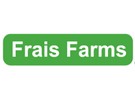A Gippsland salad producer is confident the move into organic production will provide long term benefits, despite admitting it was a tough first season.
Frais Farms moved out of the value-adding processing space, to increase its focus on growing organically.
"If you were to ask me is it working, if we looked at the data today, you would have to say that it hasn't been successful so far," Director Kim Martin said. "But there is a lot of learning, and start-up, and things that you can do differently if you had the last six months again. We wouldn't have survived in the conventional game anyway, as we didn't have the scale. You have to remember this is our first summer (growing organics), so we are new to it."
There is good demand for organic produce, according to Mr Martin, and it is definitely growing - even if it is not showing up on the bottom line just yet.
"Products can be sold for a slight premium, say 20 per cent,” he said. “When you weigh that up against your production costs and lower yield, because you have to remember you are going back to things like hand weeding, I am not sure the gross margin says that you are better off than conventional. But that's the avenue that we chose. I am actually excited by organics."
He says organic farming is different, as it is not intensive and you cannot remain on the same piece of land and continually crop it. At the moment Mr Martin is farming about 60 hectares, and says it requires moving around a bit like a patchwork quilt; not everything that is sown will be fit for consumption with some produce turned back in to build the soil profile.
"You are relying on soil health without introducing any synthetic fertilisers or plant growth stimulation into the crops - so you are going back to rotational crops to get nitrogen into the soil,” he said. “The real difference is fertilisers, so your yields are down. You cannot match the nutrient availability that you achieve with conventional farming with organics - well we haven't been able to. Weeds are a challenge, particularly if you are farming on ground where there has been weed seed happening, so that's a challenge. Pest and disease are bigger challenges again. But there are some other naturally produced products; oils and soaps and others that can be used with success."
Some of Frais Farms' produce is indirectly exported through third-party sellers, but the company mainly supplies the domestic market. Mr Martin says his salad and vegetable varieties are mainly sold to processors, into the ready to eat sector.
"We were doing the conventional vegetable production, but to survive you need to have a grand plan - a generational plan with some great family members that can take responsibilities,” Mr Martin said. “That's the future in this vegetable area. Then there's the protected cropping or glasshouse production, which is where you see a lot of corporate money. But more for the open stuff, it is more family stuff in vegetables."
While he has made the transition, he does advise caution about biting off more than you can chew, especially in the Australian market.
"The opportunity is there, it's small, I don't think it is worth converting your 100-hectare conventional farm to organics just yet," Mr Martin said. "The American market seems to have picked it up quicker. Maybe that's because in Australia there hasn't really been a need for consumers to question where their food comes from - they don't need assurances of organic or pest-free. While in the U.S. there's a perception that the use of chemicals is bad and not regulated - so maybe organics is the answer."
 For more information
For more information
Kim Martin
Frais Farms
Phone: + 61 408 986 870
sales@fraisfarms.com.au
www.fraisfarms.com.au
